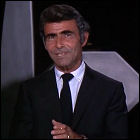 Celebrated writer Rod Serling dies at the age of 50 during a coronary bypass operation. An intelligent, rebellious mind from a young age, Serling developed an interest in writing – particularly for radio drama – before he graduated high school. He had also already developed a keen social consciousness at this age, which, combined with his authority-bucking nature, made his enlistment in the Army during World War II (immediately after graduating high school) an uneasy fit. As an Army paratrooper, Serling fought to liberate the Philippines from Japanese occupation. He was injured in combat and saw many of his comrades wounded or killed along the way, experiences which game him nightmares and informed many of his later works. He began his writing career in earnest after attending college on the G.I. Bill, and as radio gave way to television, he was at the forefront of the new profession of TV writing, with two scripts for anthology series – Patterns for Kraft Television Theatre and Requiem For A Heavyweight for Playhouse 90 – serving as career turning points. With corporate sponsors holding enormous sway over TV content in those days, Serling quickly found himself railing against the interference and outright censorship that resulted. Another anthology script, The Time Element, was intended as a pilot for an anthology Serling pitched to CBS, but was instead produced as an episode of Westinghouse Desilu Playhouse; it proved popular enough to get The Twilight Zone greenlit by CBS. Serling often used science fiction and supernatural settings in his new series to address issues such as racism, fascism, racial inequality, and the futility of war. He famously wrote many script drafts for 1968’s Planet Of The Apes, and returned to the anthology format in 1969 with a new series for NBC, Night Gallery, and, following that series, a radio drama suspense series called The Zero Hour for Mutual Radio.
Celebrated writer Rod Serling dies at the age of 50 during a coronary bypass operation. An intelligent, rebellious mind from a young age, Serling developed an interest in writing – particularly for radio drama – before he graduated high school. He had also already developed a keen social consciousness at this age, which, combined with his authority-bucking nature, made his enlistment in the Army during World War II (immediately after graduating high school) an uneasy fit. As an Army paratrooper, Serling fought to liberate the Philippines from Japanese occupation. He was injured in combat and saw many of his comrades wounded or killed along the way, experiences which game him nightmares and informed many of his later works. He began his writing career in earnest after attending college on the G.I. Bill, and as radio gave way to television, he was at the forefront of the new profession of TV writing, with two scripts for anthology series – Patterns for Kraft Television Theatre and Requiem For A Heavyweight for Playhouse 90 – serving as career turning points. With corporate sponsors holding enormous sway over TV content in those days, Serling quickly found himself railing against the interference and outright censorship that resulted. Another anthology script, The Time Element, was intended as a pilot for an anthology Serling pitched to CBS, but was instead produced as an episode of Westinghouse Desilu Playhouse; it proved popular enough to get The Twilight Zone greenlit by CBS. Serling often used science fiction and supernatural settings in his new series to address issues such as racism, fascism, racial inequality, and the futility of war. He famously wrote many script drafts for 1968’s Planet Of The Apes, and returned to the anthology format in 1969 with a new series for NBC, Night Gallery, and, following that series, a radio drama suspense series called The Zero Hour for Mutual Radio.
Tags:
Categories
Comments are closed